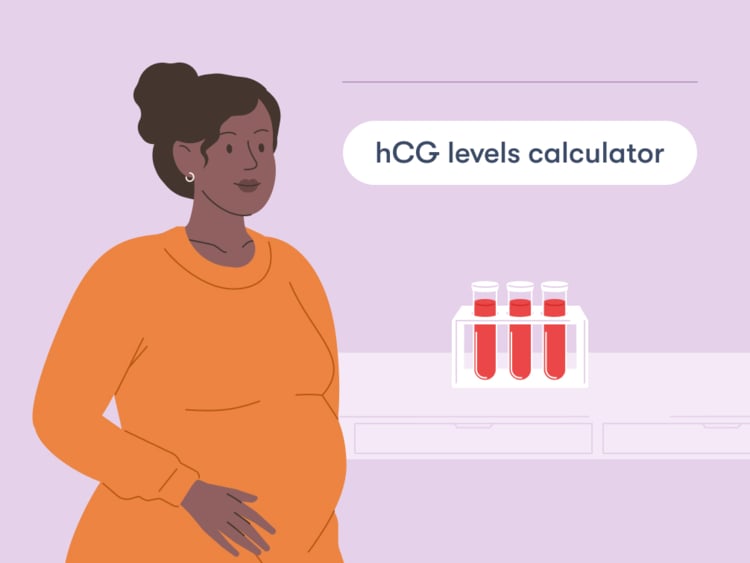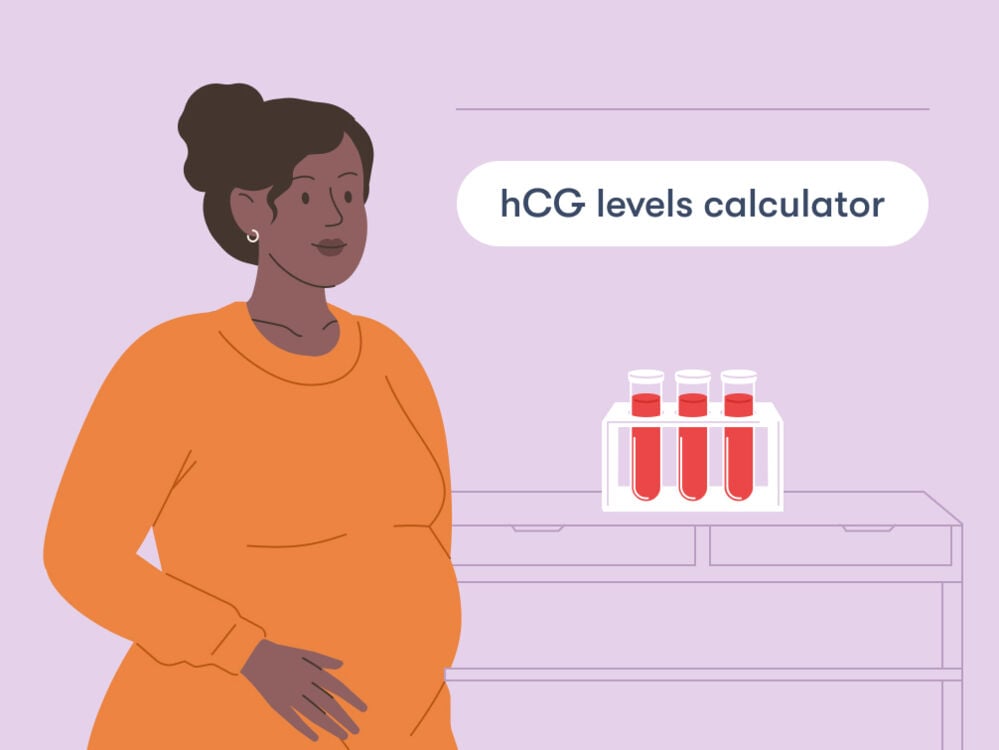-
Tracking cycle
-
Getting pregnant
-
Pregnancy
-
Help Center
-
Flo for Partners
-
Anonymous Mode
-
Flo app reviews
-
Flo Premium New
-
Secret Chats New
-
Symptom Checker New
-
Your cycle
-
Health 360°
-
Getting pregnant
-
Pregnancy
-
Being a mom
-
LGBTQ+
-
Quizzes
-
Ovulation calculator
-
hCG calculator
-
Pregnancy test calculator
-
Menstrual cycle calculator
-
Period calculator
-
Implantation calculator
-
Pregnancy weeks to months calculator
-
Pregnancy due date calculator
-
IVF and FET due date calculator
-
Due date calculator by ultrasound
-
Medical Affairs
-
Science & Research
-
Pass It On Project New
-
Privacy Portal
-
Press Center
-
Flo Accuracy
-
Careers
-
Contact Us
Beta hCG doubling time calculator and charts
Your doctor may have mentioned your human chorionic gonadotropin (hCG) levels in your early pregnancy appointments, but you might not be sure what that means. This hCG calculator may help you understand them better, along with the help of a Flo expert.



Your Flo membership is now active
To start your journey:- 1. Download the Flo app.
- 2. Log in to your account.
- Remember that hCG calculator tools and hCG level charts can help you learn more about the part hCG plays in pregnancy. However, results are estimates, and they are for informational purposes only, not a replacement for medical advice or as a self-diagnosis tool. Your doctor should always be your first resource when it comes to tracking and explaining hCG progression.
- Please note that Flo Health does not collect, process, or store any of the data that you enter while using these tools. All calculations are done exclusively in your browser. Flo Health does not have access to the results. All data will be permanently erased after leaving or closing the page.

Key takeaways on understanding hCG levels
- Human chorionic gonadotropin is a hormone produced during early pregnancy. It can be detected in your blood and urine, and it’s what pregnancy tests look for.
- HCG is produced by your placenta and helps support your pregnancy by thickening your uterine lining.
- It can be detected in blood about 10 days after conception and in urine around 14 days after conception.
- In early pregnancy, hCG levels rise, peaking at around 10 weeks. While you may have heard of them doubling every few days, this isn’t the case for everyone. The levels then usually plateau or drop slightly as your placenta takes over hormone production to support your pregnancy.
- Generally, a health care professional won’t check your hCG levels unless they feel there’s a need to. It isn’t a routine test, and you don’t need to check them yourself at home.
- Lower than expected hCG levels for your stage of pregnancy can be concerning, but it doesn’t always mean there’s a problem. Check with your doctor about what they recommend.
- It’s important to remember that hCG levels are not a diagnosis on their own. They are just a sign that your doctor might need to do more tests. The tool above is designed for informational purposes only; you should always reach out to a health care provider for early pregnancy advice and support.
What is hCG?
You may have heard your doctor refer to beta human chorionic gonadotropin, or hCG, in your early pregnancy appointments but not be sure what it is. Pregnancy is filled with new medical language and acronyms, and Flo can help you decode some of them.
Put simply, hCG is the hormone your body produces when you become pregnant. It shows up in your blood or urine and is one of the earliest signs of pregnancy. It’s what at-home urine pregnancy tests detect for. Similarly, you may have had a blood test at your doctor’s office to confirm your pregnancy, which looks for hCG in your blood.
“This hormone plays a key role in developing the pregnancy,” explains obstetrician and gynecologist Dr. Renita White, Georgia Obstetrics and Gynecology, Georgia, US. “It helps to thicken the uterine lining that supports pregnancy. It also helps to support the production of progesterone, which is another hormone important for pregnancy.”
You might be curious to know more about your hCG levels, considering they indicate that your pregnancy is progressing. While sometimes experts refer to the levels as “doubling” every few days in pregnancy, this isn’t the case for everyone. Instead, they may just gradually rise.
You can use Flo’s hCG calculator to better understand how yours might rise. However, you’d only test your hCG levels if they were highlighted in a medical appointment, and there’s no scenario where you’d need to keep checking your labels at home. Here’s why.
When does hCG start showing up?
First up, you might be wondering when hCG starts to show up and where it comes from. The pregnancy hormone can be picked up in your urine and blood once your fertilized egg has attached to your uterine lining. This is known as implantation.
Let’s back up a second. In every cycle, one of your ovaries will release an egg to be potentially fertilized by a sperm. This is known as ovulation. If your egg is met and fertilized by a sperm, it may move down one of your fallopian tubes to your uterus. There, it will implant into your uterine lining and start to grow and develop.
This process can take six to 10 days, meaning that implantation doesn’t happen for six to 10 days after conception. “By the time this happens and your body begins to produce hCG, the hormone can be detected in the blood about 10 days after conception,” reveals Dr. White. “It can be detected in urine about 14 days after conception.”
If hCG starts to be produced just after implantation, you might be curious when you can take a pregnancy test. It’s important to bear in mind that hCG production takes a little while to get going. While your hCG levels are low at first, they rise through early pregnancy, peaking at around 10 weeks.
So, hCG needs a chance to build up to a certain point before it will show up on a pregnancy test. “The best time to take a pregnancy test is after you’ve missed your period,” says Dr. White. “This gives you a more likely chance for hCG to be present in the urine.”
While it’s possible to get a positive test before you’ve missed your period using an early pregnancy test — testing before this point can result in an unreliable result because hCG levels might not be high enough to be detected, she adds.
HCG chart: How might your hCG levels change in early pregnancy?
Whether this is your first pregnancy or not, it’s typical to wonder if what you’re experiencing is “normal.” However, every pregnancy is different, and it’s crucial that you use your doctor as a guide through this time. They’ll closely examine you and your baby and let you know if there’s anything you need to keep an eye on.
Your doctor may check your hCG levels once or twice in your 1st trimester. If your levels are lower than expected the first time they test, they may test again in a few days. They may do this to try to establish any abnormalities early. This may sound really daunting, but keep reading for more information and always rely on your doctor. If you have any questions, they will be there to support you.
As everyone is different, it can be really difficult to give definitive answers as to how your hCG levels may change in early pregnancy. However, here’s an example of how hCG may rise in the first few weeks of pregnancy:

Again, it’s normal to not be aware of your hCG levels. You don’t need to know them. Your hCG levels will only ever be measured if your doctor feels it’s necessary, and this calculator should only be used for informational purposes.
When do your hCG levels stop increasing?
“HCG continues to increase until about eight to 10 weeks of pregnancy,” explains Dr. White. “This is because the placenta has developed and starts to take over in producing hormones that maintain the pregnancy at this point.”
After this stage, your hCG levels will start to level off and will drop gradually until childbirth.
Not everyone’s hCG levels will rise as quickly or in the same way during early pregnancy, and that’s OK. As long as your levels are rising overall and there are no other signs of concern, a slower rise can still be perfectly fine.
What should you do if hCG levels are low?
If your doctor has checked your hCG levels, and your blood test has come back confirming they’re lower than expected for your stage of pregnancy, you might be worried. However, this doesn’t always mean there’s a problem. Low levels could simply indicate that you’re not as far along in your pregnancy because the date of your last menstrual period wasn’t predicted accurately. This can happen as cycles can vary in length, and you can ovulate on different days each month.
Ultimately, when it comes to hCG levels, it’s crucial to remember that every pregnancy is different. HCG levels can vary from person to person, and a health care professional can give you insight into what’s happening and whether additional tests or follow-ups are needed.
“In early pregnancy, there can be a lot of anxiety, but I would recommend waiting on your first ultrasound that is done around eight weeks of pregnancy,” says Dr. White. “If you have abnormal symptoms, like bleeding or significant pain, check in with your doctor to see if you should have your hCG tested.”
It’s important to remember that hCG levels are not a diagnosis on their own. They are just a sign that your doctor might need to do more tests. The tool above is designed for informational purposes only; you should always reach out to a health care professional for early pregnancy advice and support.
Frequently asked questions about calculating hCG
What do high hCG levels mean?
If your doctor has run a blood test and said your hCG levels are higher than expected, it could indicate that you’re expecting twins or triplets. However, you’ll need an ultrasound scan to confirm this. Higher than average hCG levels could also suggest your due date is wrong and you’re further along in your pregnancy than you thought.
Some complications can also cause higher hCG levels. These include molar pregnancies, which are when abnormal, noncancerous growths grow within the uterus after a sperm fertilizes your egg. This is relatively rare, but your doctor will need to remove a molar pregnancy as it can be dangerous.
Ultimately, it’s best to rely on a health care professional. They will be able to establish if your hCG levels need monitoring or if it’s best to wait until your first ultrasound before investigating further.
When should you take a pregnancy test?
The best time to take a pregnancy test is after a late or missed period. It’s usually around two weeks after you’ve ovulated. Waiting until this point gives you the best chance of getting a clear and accurate result with enough hCG in your urine to be detected.
While it’s possible to get a positive test before a late or missed period using an early pregnancy test, testing before this point isn’t recommended because the hCG levels might still be too low to detect. Waiting a little longer can help ensure more accurate results.
Learn more with Flo!
References
Betz, Danielle, and Kathleen Fane. “Human Chorionic Gonadotropin.” StatPearls, StatPearls Publishing, 2025, www.ncbi.nlm.nih.gov/books/NBK532950/.
“Human Chorionic Gonadotropin.” Cleveland Clinic, my.clevelandclinic.org/health/articles/22489-human-chorionic-gonadotropin. Accessed 16 Jan. 2025.
“Molar Pregnancy.” Cleveland Clinic, my.clevelandclinic.org/health/diseases/17889-molar-pregnancy. Accessed 16 Jan. 2025.
Pittaway, Donald E., et al. “Doubling Times of Human Chorionic Gonadotropin Increase in Early Viable Intrauterine Pregnancies.” American Journal of Obstetrics and Gynecology, vol. 152, no. 3, June 1985, pp. 299–302, https://doi.org/10.1016/S0002-9378(85)80215-5.
“Placenta.” Cleveland Clinic, my.clevelandclinic.org/health/body/22337-placenta. Accessed 16 Jan. 2025.
“Pregnancy Tests.” Cleveland Clinic, my.clevelandclinic.org/health/diagnostics/9703-pregnancy-tests. Accessed 16 Jan. 2025.
Marnach, Mary. “What Ovulation Signs Can I Watch for if I Want to Get Pregnant?” Mayo Clinic, 9 July 2024, www.mayoclinic.org/healthy-lifestyle/getting-pregnant/expert-answers/ovulation-signs/faq-20058000.
Su, Ren-Wei, and Asgerally T. Fazleabas. “Implantation and Establishment of Pregnancy in Human and Nonhuman Primates.” Advances in Anatomy, Embryology, and Cell Biology, vol. 216, 2015, pp. 189–213, doi:10.1007/978-3-319-15856-3_10.